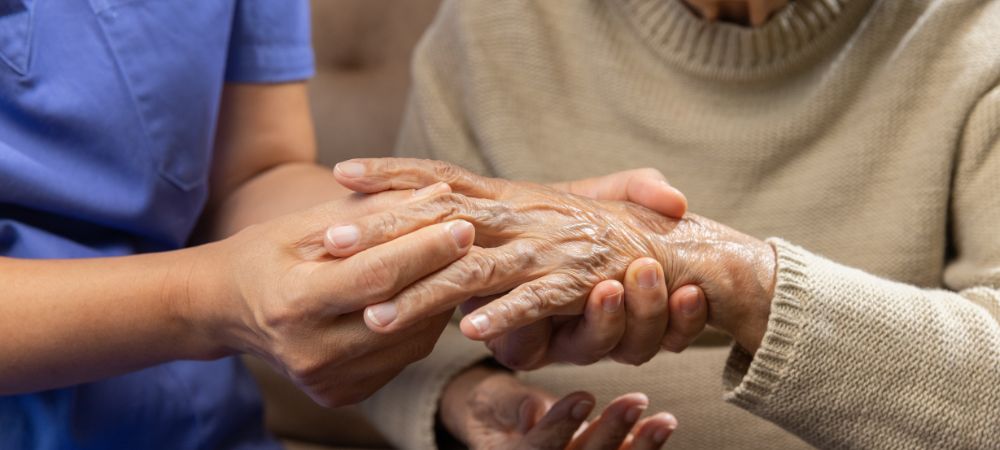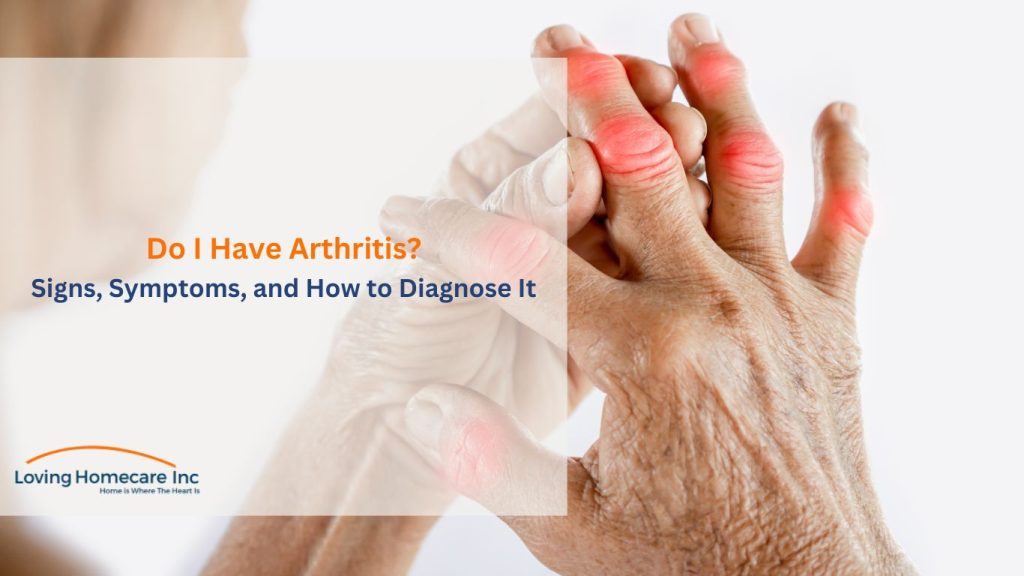Recently updated on May 14th, 2025 at 01:46 pm
Arthritis is a common condition affecting millions of people, especially those over 50. It causes joint pain, stiffness, and inflammation, which makes moving around difficult.
Are you wondering how to know if you have arthritis? For that, you need to understand and recognize the symptoms of arthritis. Your healthcare provider can help you determine the type of arthritis you have, what is causing it, and the best ways to manage it.
30 Seconds Summary
- Arthritis causes joint pain, stiffness, and swelling and can affect daily activities. It can result from wear and tear, autoimmune diseases, or other conditions.
- Common types of arthritis are osteoarthritis, rheumatoid arthritis, gout, and psoriatic arthritis. Symptoms vary by joint but often include pain, swelling, and limited movement.
- Doctors diagnose arthritis using physical exams, imaging tests, blood tests, and joint fluid analysis. Treatment includes medications, physical therapy, lifestyle changes, and, in severe cases, surgery.
- If you experience persistent joint pain, swelling, or stiffness, see a doctor early to slow down the progression of the disease and improve your quality of life.
What Is Arthritis?
 Arthritis is a condition that causes pain, stiffness, and inflammation in the joints. It can affect people of all ages, including children and seniors.
Arthritis is a condition that causes pain, stiffness, and inflammation in the joints. It can affect people of all ages, including children and seniors.
Some joints naturally wear down over time, especially as you age. This wear and tear can lead to arthritis, but injuries or underlying health conditions can cause joint damage.
Arthritis can develop in any joint but most commonly affects the hands, knees, hips, and spine. If you’re experiencing persistent joint pain that interferes with daily activities or limits movement, it’s important to consult a healthcare provider. They can help diagnose the type of arthritis you have and recommend ways to manage the symptoms of arthritis.
If you or a loved one is dealing with arthritis, the trained caregivers at Loving Homecare can help with daily activities, medication management, and personalized care plans.
What are the Common Types of Arthritis?
There are many types of arthritis, but some of the most common include:
- Osteoarthritis is caused by years of wear and tear on the joints.
- Rheumatoid Arthritis: It happens when the immune system mistakenly attacks the joints.
- Gout is caused by a buildup of uric acid crystals in the joints, leading to pain and swelling.
- Ankylosing spondylitis: It is a type of arthritis that mainly affects the spine and lower back.
- Psoriatic arthritis is a type of arthritis that affects people with psoriasis, a skin condition.
- Juvenile arthritis: It is a form of arthritis that affects children and teenagers.
Some types of arthritis wear down the joints over time, while others cause swelling that leads to damage. Knowing which type you have can help you find the right treatment to manage pain and stay active.
If you’re looking for arthritis prevention tips for seniors, maintaining a healthy weight, staying active, and protecting your joints can lower your risk. Visit Loving Homecare to learn more about arthritis prevention.
Early Signs and Symptoms of Arthritis
Are you experiencing unexplained joint pain or stiffness? Here are the early arthritis symptoms to watch for:
- Joint pain that worsens after activity or rest
- Swelling and tenderness around the joints
- Reduced range of motion
- Warmth and redness in the affected area
- Morning stiffness lasting longer than 30 minutes
If you notice any of these signs, it’s important to seek medical advice and begin treatment if necessary.
How to Know If I Have Arthritis in My Hands, Fingers, or Knees?

How to Know If I Have Arthritis in My Hands?
Do your hands feel stiff, swollen, or weak? Many assume these are arthritis symptoms, but tendonitis can cause similar issues. Knowing the difference is key to getting the right treatment.
Arthritis vs. Tendonitis
- Tendonitis: Inflammation of the tendons from injury or overuse. Pain comes and goes.
- Arthritis: Joint inflammation caused by wear and tear (osteoarthritis) or an immune system attack (rheumatoid arthritis). Pain is persistent and worsens over time.
Symptoms of Arthritis in Hands
- Ongoing pain in hands, fingers, or wrists
- Swelling and stiffness, especially in the morning
- Weak grip strength and reduced movement
How to Know If I Have Arthritis in My Fingers?
Arthritis of the fingers can cause pain, stiffness, and swelling, making everyday tasks difficult. Early treatment can help manage symptoms and slow the progression of the disease.
Here is what arthritis in the fingers feels like:
- Pain: A dull, burning pain, especially after using your hands.
- Swelling: Joints may become puffy, red, and sore.
- Stiffness: Difficulty moving fingers, especially in the morning.
- Warmth: Inflamed joints may feel warm to the touch.
- Weak grip: Trouble opening jars, turning keys, or grasping objects.
- Bumps: Small lumps (Heberden’s or Bouchard’s nodes) may form on fingers.
- Numbness or tingling may be linked to nerve compression (like carpal tunnel).
- Bent fingers: Severe arthritis can lead to joint deformities like Boutonniere deformity.
How to Know If I Have Arthritis in My Knee?
Arthritis of the knee causes pain, swelling, and stiffness, which can make movement difficult. It can affect one or both knees and worsen over time.
Here are some of the most common symptoms of arthritis in knees:
- Pain: Aching or sharp pain, especially during movement or after activity.
- Swelling: The knee may become puffy and tender due to inflammation.
- Stiffness: Limited movement, especially in the morning or after sitting for a long time.
- Weakness: Difficulty standing up or climbing stairs.
- Popping or cracking sounds: Damaged cartilage may cause noises when moving.
- Warmth and redness: The knee may feel warm due to inflammation.
Arthritis in knees can be of different types, including:
- Osteoarthritis: It is the most common type, which is caused by cartilage wear and tear.
- Rheumatoid arthritis: It is an autoimmune disease that attacks knee joints.
- Juvenile idiopathic arthritis is the most common arthritis in children, affecting knee joints.
Early treatment can help manage symptoms and slow down the progression of the disease. If knee pain starts affecting your daily activities, consult a doctor.
How to Get Arthritis Diagnosis? What to Expect
If you think that you have arthritis, you need to get a diagnosis. Here is what your doctor may do:
- Physical Exam
Your doctor may start with a physical examination. He would check for swelling, redness, and restrictions in joint movement.
- Imaging Tests
Later on, he would get X-rays, MRIs, or CT scans to assess joint damage
- Blood Tests
Your doctors would also conduct blood tests to detect markers of inflammation or autoimmune conditions.
- Joint Fluid Analysis
Your doctor would also conduct joint fluid analysis to identify signs of infection or gout.
The sooner you get diagnosed, the better your chances of slowing down the progression of the disease.
How to Know if I Have Rheumatoid Arthritis?

Common Signs of RA
- Swollen, tender joints often in the hands, feet, and wrists.
- Stiffness in the morning that lasts 30 minutes or more.
- Tiredness and weight loss caused by inflammation.
- Pain is present on both sides of the body, for example, knees and wrists.
Other Possible Symptoms
- Dry eyes and mouth.
- Lumps under the skin (rheumatoid nodules).
- Trouble breathing or chest pain.
When Should You See a Doctor for Joint Pain?
If joint pain is persistent, worsens over time, or is accompanied by swelling and stiffness, see a doctor immediately. Early diagnosis and treatment can prevent further damage.
Managing Arthritis: Treatment Options and Prevention Tips
While there is no cure for arthritis, several treatment options can help manage symptoms:
- Medications such as pain relievers, anti-inflammatories, and immune-modulating drugs can help relieve the symptoms.
- Physical Therapy can help strengthen muscles around the joints.
- You would also need to make a few lifestyle changes, such as weight management, exercise, and diet modifications.
- Joint replacement surgery in severe cases only.
For additional resources on arthritis care, visit Loving Homecare.
Over to You
Whether you have arthritis in your hands, fingers, or knees, you must get a proper diagnosis for effective treatment. Seeking timely medical advice can help you manage symptoms and live pain-free lives!
If you’re ready to take charge of your joint health, explore in-home senior care options with Loving Homecare today.

